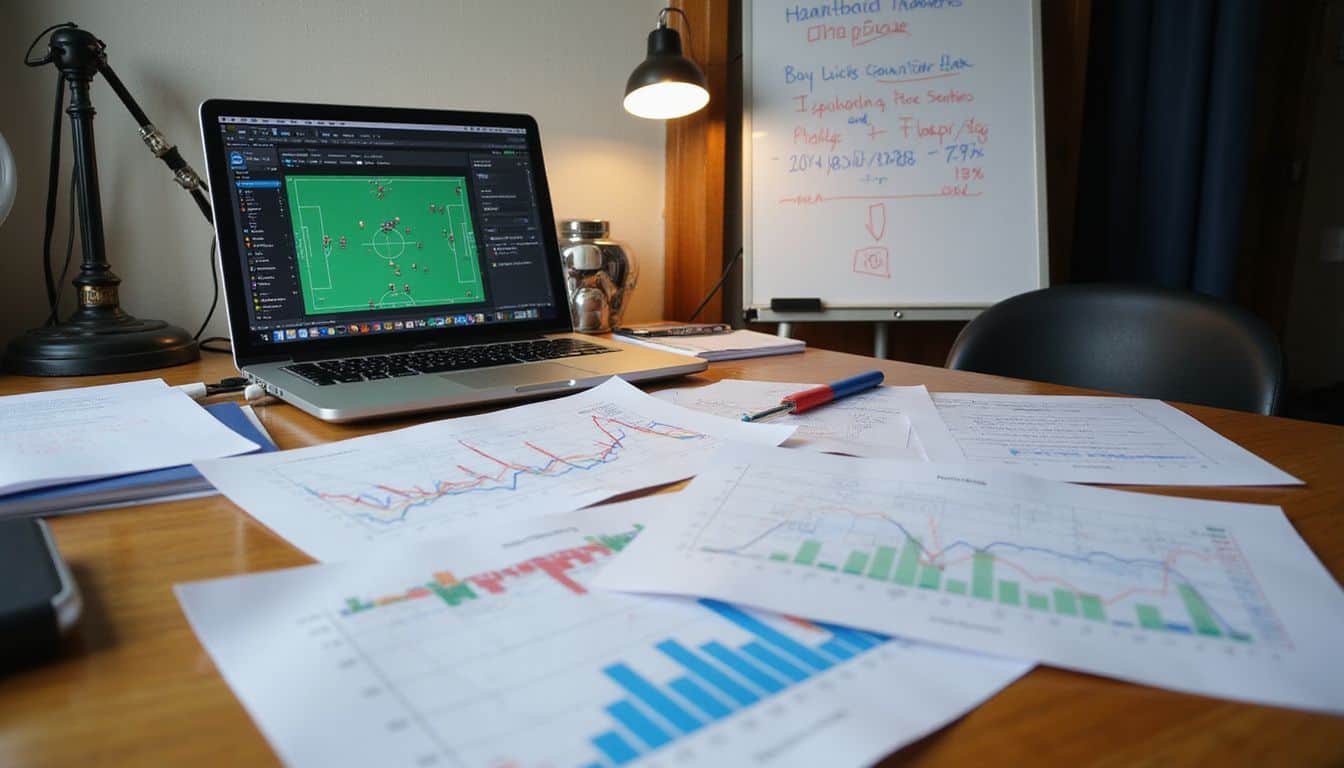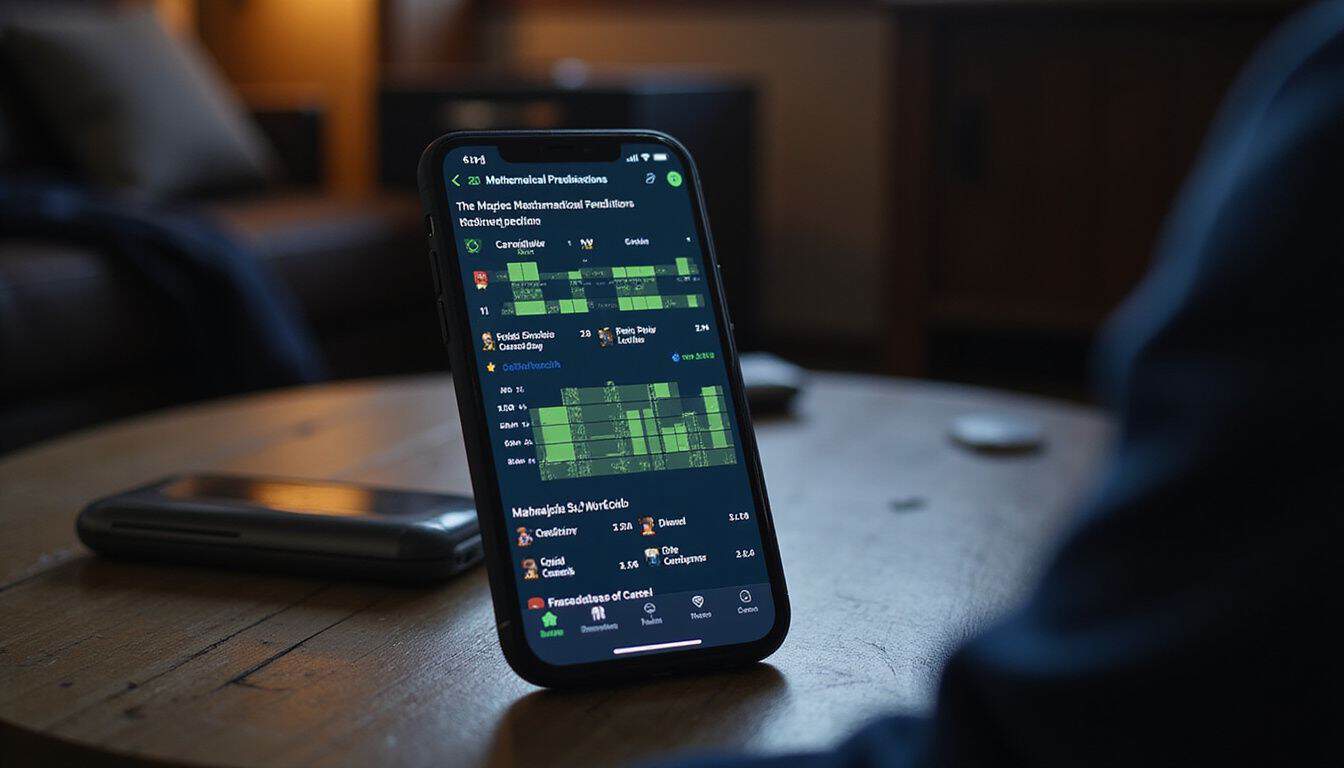Are you tired of losing bets due to weak football predictions and risky guesses? AI-based mathematical sports predictions use powerful data analysis, covering leagues like the Premier League, Copa Libertadores, Serie A, and UEFA Champions League.
You’ll discover how these accurate models can sharpen your betting choices and lift your chances of success. Read on to find out if AI could be your ticket to more wins!
Key Takeaways
AI-driven sports predictions use real-time data and complex math models to boost outcome accuracy up to 74%. Analysts closely track player metrics, historical trends, momentum shifts, and even injury risks in top leagues like Premier League or tournaments such as Copa Libertadores.
Teams that fully rely on detailed data analytics may improve their overall results by around 7.3%, according to a McKinsey & Company report. Clubs also achieve performance gains of about 5%–8%, while reducing injuries nearly 20%.
Mathematical modeling helps bettors spot value bets—cases where bookmaker odds exceed calculated probabilities—from apps like DraftKings using thousands of simulated outcomes. For example, predicting undervalued matchups involving teams like Manchester City vs Spurs or Palmeiras in Brazil has led many users toward smarter betting choices.
Despite advances, prediction systems can fail due to outdated or incomplete information (such as missing injury updates), restricted access caused by legal limits on real-time data feeds, unexpected game events (sudden injuries), and model overfitting issues.
By around 2025, personalized AI-powered platforms will emerge for fans who bet regularly; these tools could analyze past user’s habits accurately enough to offer tailored recommendations based precisely upon risk preference and favorite teams.
Table of Contents
The Role of Data in Sports Predictions

Sports data helps AI track trends, player stats, and real-time performance for accurate game predictions. Today’s betting apps use live updates and statistical analysis tools to forecast results for leagues like LaLiga Spain or tournaments such as the CONCACAF Champions League.
Historical performance metrics

Historical performance metrics let teams and bettors see clear patterns in game outcomes. Analysts use stats such as Player Efficiency Ratings (PER), possession percentages, expected goals (xG), win rates, under/over 2.5 goals trends, both to score records, and handicap results like double chance or asian handicap bets.
Over 97% of pro sports clubs around the globe now hire dedicated data analysts to gain an edge on opponents through insights from past matches. As McKinsey & Company found out, teams that rely on historical data improve their overall outcomes by about 7.3%.
In my own betting experience with DraftKings promo codes for new users, studying team histories like Manchester City vs Spurs clashes or Palmeiras at Copa do Brasil helped me find undervalued odds hidden behind bookmaker lines.
The key is turning yesterday’s numbers into today’s winning choices.
Real-time data collection

Real-time data collection uses tools like computer vision and wearable sensors to track players. These devices give precise updates on player movements, speed, heart rate, and stamina during games such as Copa America or Liga Profesional matches.
Such details allow predictive analytics models to estimate results with up to 74% accuracy. Injury prediction systems also benefit from this live data, spotting non-contact injury risks for players like those in UEFA Europa League matches at an 85% success rate.
With real-time stats flowing into machine learning models instantly, bettors and teams alike get quicker insights than traditional bookmaker odds provide—raising their chances of accurate decisions.
How Mathematical Models Drive Predictions

Math models study sports data, using numbers and probability to predict game results. Powerful tools like the Poisson distribution and AI machine learning help teams, bettors, and tipsters improve prediction accuracy.
Statistical analysis in sports

Statistical analysis uses team data to predict sports outcomes, like win-loss results of NFL games. Analysts review historical performance metrics such as player efficiency, scoring rates, and defensive records.
Techniques like decision trees and binary logistic regression identify patterns within football statistics or soccer leagues such as Brasileiro Serie A or Liga Portugal. Such methods help fans or gamblers decide on fixed odds bets, handicaps, or better assess probabilities for matches in competitions including Copa Sudamericana or OFC Nations Cup.
Sports analysts can also apply distribution models—for example Poisson—to predict the number of goals Urawa Red Diamonds might score against Valerenga next matchday. Statistical models clarify how indicators, momentum shifts, injuries—or even a Pep Guardiola tactical change—influence outcomes across tournaments from FIFA Confederations Cup to Scottish Premiership games involving teams like Aberdeen FC versus Celtic FC.
The deeper these statistical insights become through AI-supported modeling—the more accurately tomorrow’s live predictions will reflect real gameplay dynamics across various national cups worldwide.
Machine learning and AI applications take sports prediction methods even further today.
Machine learning and AI applications

Moving beyond simple statistics, machine learning kicks sports predictions into high gear. Smart algorithms analyze large data sets from soccer teams like São Paulo or clubs in Oberliga Westfalen to spot hidden patterns humans miss.
Using AI-driven predictive models, accuracy rates for predicting match outcomes can reach up to 74%. Tools such as Google’s TensorFlow help crunch these numbers swiftly, guiding both bookmaking and bet placements.
With AI’s help, predicting tomorrow’s winner between CD Águila or Isidro Metapán is sharper than ever.
Teams now also use AI applications to boost player skills and cut injury risks. Groups playing fiercely contested cups like the Recopa Sudamericana or Saudi Pro League leagues see technology improve athlete performance by around 5-8% while reducing injuries by nearly 20%.
Apps available on Google Play make real-time player tracking easy even for dedicated geeks who follow Bohemians 1905 matches on Telegram channels. These tech-savvy methods let fans gauge momentum shifts quickly during games in Europe’s Primera División and CONMEBOL tournaments alike.
Key Components of Mathematical Sports Predictions

Mathematical sports predictions depend on clear probability calculations and accurate player performance stats. AI models now often factor in momentum shifts, making outcomes feel closer to reality than ever before.
Probabilities and win-rate calculations

Probabilities help geeks predict outcomes in sports like football matches, such as Regionalliga East or Ligue 1 Algeria. For instance, bookmaker odds of 1.30 suggest a win probability near 77 percent, yet past results may show only a 60 percent historical WinRate for teams like Osasuna or New Mexico United.
Using AI-powered tools and models, you can filter game predictions by live status—planned or finished—and narrow down your bets to probabilities above thresholds of 60 percent, 75 percent, or even a confident 90 percent.
Value bets appear when bookmakers offer odds higher than what prediction algorithms estimate—for example—in Primera Division games involving CD Aguila versus Municipal Limeno. Through personal practice I’ve learned the benefit of tracking differences between algorithm-derived probabilities and actual betting odds offered on platforms covering events from Oceania’s Club World Championship to Europe’s Super Cup matches with Union Saint-Gilloise.
Probabilities alone aren’t enough though; understanding player and team performance indicators is key too.
Player and team performance indicators
Player and team performance indicators give clear numbers for athletes’ skills and team strength. Coaches use metrics like passes completed, tackles made, shots taken, goals scored, and saves to rate players objectively.
AI analytics takes raw data from matches such as the Finalissima or Regionalliga Nordost games, then turns it into clear ratings for each athlete.
Teams that rely on data-driven decisions boost their wins by an average of 7.3%, according to a report by McKinsey & Company. On top of that, AI analysis helps raise player performance between 5% and 8%.
Look at clubs like Southampton in the Premier League or Defensa in South America; they track momentum shifts, win rates over past events like Pokal rounds or Intercontinental Cup clashes to clearly see strengths and weaknesses.
Momentum-based prediction models
Beyond basic stats of team play and player skill, momentum-based prediction models use recent trends to pick winners. These smart models spot which teams heat up or cool down by tracking streaks and sudden shifts in play style.
For example, tennis match predictions often use algorithms like CatBoost regression or Random Forest to study momentum swings during matches. The Composite Bayesian Regression Framework (CBRF) combines these two methods to boost accuracy even more.
It simplifies the complex factors behind “momentum” into three clear parts through Principal Component Analysis (PCA). Such an advanced sports prediction model can help forecast outcomes in games for clubs like Leicester in soccer’s Premier League, Haugesund in Norway’s Eliteserien, Molde, Torpedo Kutaisi from Georgia, CD FAS vs Isidro Metapan rivalry clashes—or even betting expectations for tomorrow’s Tepatitlan vs Leones Negros matchup—far better than relying purely on luck.
Advantages of Mathematical Sports Predictions

Mathematical sports predictions powered by machine learning deliver sharper forecasts—and boost your chances to spot hidden betting gems in markets like Eredivisie, World Cup, or Brazilian leagues such as São Paulo.
With strong data insights available directly on apps for Android devices, fans gain an edge and smarter ways to play.
Enhanced accuracy for outcomes
AI prediction tools now reach up to 74% accuracy in forecasting sports outcomes. Using real-time data and advanced stats, machines can quickly study historical team performance like Atlético Nacional or OFK Beograd, player conditions in leagues such as the Eredivisie, or even momentum shifts before games like Firpo versus São Paulo.
Bettors using mathematical football predictions see clearer odds for matches tomorrow or during major events like the World Cup.
Real-time data updates let apps on Android devices instantly refresh win probability calculations throughout a game—say Tirol against Backa. These swift adjustments provide quick insights that boost confidence and help users make smarter bets at crucial points of play.
Data-driven results lower risks by capturing hidden patterns other methods might overlook, enabling more informed betting choices for geeks exploring global soccer matchups every day.
Better decision-making for teams and bettors
More accurate predictions lead directly to smarter betting and team decisions, thanks to machine learning models that use real-time data. For example, tomorrow’s predictions for the match between Atletico Nacional and Sao Paulo will factor in recent player stats, game momentum trends, and past meetings.
You can pick your bets based on customized options matching your own history and preferences — which I’ve found saves time and boosts wins. Automated systems also cut down human errors; by 2023 sports-focused AI tools had lowered mistakes in betting transactions by around 35%.
Identification of undervalued opportunities
Mathematical sports predictions often highlight value bets. These happen if bookmaker odds are higher than an algorithm’s estimated probability. AI models compare historical player data and team stats to current betting lines.
For example, analytics tools like FiveThirtyEight use win probabilities based on thousands of simulations. They pinpoint matchups where bookmakers have set incorrect odds for outcomes or point spreads.
Using these insights can boost your accuracy in predictions for tomorrow.
Finding undervalued bets turns math into winnings.
Challenges in Mathematical Sports Predictions

Even with top machine learning tools and detailed statistics, bad data or weak algorithms can still derail sports predictions—find out how to overcome these issues and lift your game.
Data quality and availability issues
Bad data leads AI models to fail. In sports betting, accurate information is crucial for predicting game outcomes and win-rate calculations. I have seen poor accuracy result from outdated or incomplete player stats — like missing injury updates or delayed results reports.
Legal limits can also sharply restrict access to critical real-time data feeds, causing prediction delays. Model overfitting is a big concern, too; flawed performance metrics cause algorithms to predict well in training but poorly on live games.
Solving these data quality and availability issues involves exploring the current limitations of existing mathematical models and algorithms used today.
Limitations of existing algorithms
Current algorithms for math-based sports predictions still fall short facing complex problems. Even powerful machine learning tools, like neural nets or regression models, struggle to factor sudden player injuries or weather effects into their forecasts.
Last season, a star quarterback’s surprise injury threw off my AI-powered prediction model badly—something humans could have quickly adjusted for with critical thinking. Human creativity helps experts grasp subtle game factors and team spirit that data alone fails to show clearly.
AI methods are great at crunching numbers but weak at handling unexpected events and reading deeper meanings hidden behind raw statistics in sports games today.
The Future of Sports Predictions

Sports predictions will soon harness advanced AI tools and real-time analytics, changing how geeks bet and follow their favorite games—read on to discover what’s next!
Integration of advanced AI systems
Advanced AI systems bring sports predictions to a new level of accuracy and speed. Machine learning models already predict the outcomes of games correctly up to 74% of the time, giving teams and bettors a clear edge.
These smart algorithms process huge sets of player data, game records, and real-time stats quickly. They find hidden patterns humans might miss.
AI tools also change how athletes train — improving their play by 5-8% while cutting injuries by about 20%. Deep learning programs like TensorFlow can study every move made during past games or workouts.
This helps coaches design better training plans for each player so they perform at their peak safely in every match.
Real-time predictive analytics in sports
Real-time predictive analytics uses AI to quickly study huge datasets and player stats during games. Data from wearables, live feeds, and sensor tech give instant insights into player speed, fatigue levels, or team formation.
Sports betting apps like DraftKings make use of live data streams to predict outcomes as matches unfold. This helps bettors adjust their wagers fast based on changing game events.
Machine learning methods process thousands of data points each second for accurate forecasts in baseball or football games. Real-time processing boosts accuracy by considering current play conditions such as injuries or field weather.
For instance, IBM Watson’s sports platform can analyze match patterns in real time to suggest the next best action to coaches within seconds. It also improves performance efficiency for sportsbooks running quick odds updates on digital platforms during major league events like Super Bowl Sunday or World Series Game 7s.
Personalized sports predictions for fans
Real-time analytics open doors for personalized sports predictions, powered by advanced AI and machine learning tools. By 2025, fans will gain access to football betting tips that use personal habits and preferences.
For instance, apps like DraftKings already track your past bets and favorite teams to offer tailored picks with greater accuracy.
Sports geeks will soon benefit from custom insights driven by their own data history. AI tools will analyze your prior betting record, team loyalty, and risk style to enhance betting strategies with focused suggestions.
Platforms could advise if you bet too often on the Dallas Cowboys or alert you when undervalued matches align closely with your usual interests—making each wager smarter through individualized math-based predictions.
How Will Mathematical Sports Predictions Evolve in 2025?

In 2025, sports predictions will grow smarter with advanced AI systems. Powerful machine learning models will take in diverse statistics from over 1,000 football leagues worldwide to foresee precise match outcomes—like who scores first or exact goal counts.
Fans and bettors can expect accurate data covering everything from major international tournaments to local league games, all updated instantly before kick-off. With improved predictive analytics on the horizon, users will soon have tools to filter matches based on probability ratings or easily sort events by time or competition.
On a personal note, I’ve noticed how mathematical modeling already helps fans sharpen their betting choices through clear statistical insights; yet innovations coming up by 2025 promise even further leaps ahead.
For instance, future platforms aim at highlighting specific upcoming matches with detailed numeric forecasts for better planning of bets and strategy building—whether it’s regular soccer or exploring sports compared to esports.
Combined advances like these point directly toward higher winning rates driven by smart use of math-based prediction technology.
People Also Ask
What are mathematical sports predictions, and how does AI help?
Mathematical sports predictions use data analysis and math models to forecast game outcomes. Artificial intelligence studies past results, player stats, team performance, and other factors to spot patterns. By analyzing these details carefully, AI can boost your chances of picking winners.
Can using AI for sports betting really increase my wins?
Yes, it can—but success isn’t guaranteed every time. AI tools analyze large amounts of information quickly and accurately to find trends humans might miss. While this helps you make smarter bets overall, unexpected events still happen in games—so always bet responsibly.
Do I need special skills or knowledge to use an AI prediction tool?
Not at all! Most modern prediction software is easy-to-use—even if you’re new to sports betting or technology in general. You simply input basic details about teams or players; the program then analyzes the numbers for you clearly and quickly.
Is relying solely on mathematical predictions a good idea when placing bets?
While math-based forecasts offer valuable insights into likely outcomes—they shouldn’t be your only guide when making decisions about wagers on sporting events! Always combine these precise calculations with common sense judgment—and stay updated on recent news—to improve accuracy further before placing any bets confidently!
References
https://www.numberanalytics.com/blog/data-metrics-ai-sports-analytics (2025-03-27)
https://blog.jobsinsports.com/2024/12/23/ai-in-sports-betting/ (2024-12-23)
https://www.numberanalytics.com/blog/ai-elevates-sports-analytics
https://www.sciencedirect.com/science/article/pii/S2772662223001364
https://rg.org/guides/sportsbetting-guides/sports-betting-algorithms
https://www.sciencedirect.com/science/article/pii/S2210832717301485
https://www.nature.com/articles/s41598-024-69876-5
https://ideausher.com/blog/aimodels-sports-prediction-betting-apps/
